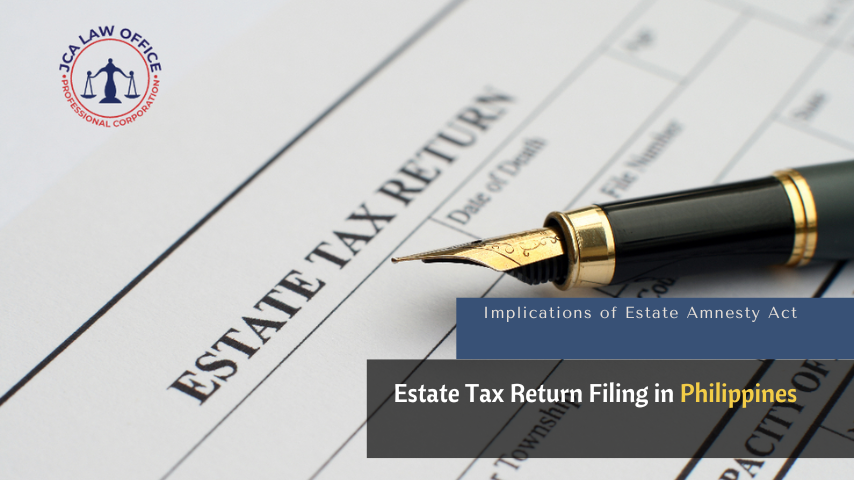The Estate Tax is a tax imposed on the transfer of the estate of a deceased individual to their heirs. In the Philippines, the process of filing an estate tax return can be complex and time-consuming. However, the introduction of the Estate Tax Amnesty Act has brought significant changes that can benefit taxpayers. This article provides a comprehensive guide to filing an estate tax return in the Philippines and discusses the implications of the Estate Tax Amnesty Act.
I. Filing the Estate Tax Return in the Philippines
1. Determining the Taxable Estate
The first step is to determine the gross estate, which includes all the properties, rights, and interests of the deceased at the time of their death. This can be further categorized into real estate, personal properties, and intangible assets. After identifying the gross estate, certain deductions are allowed by law, such as:
- Ordinary deductions: Funeral expenses, judicial expenses, and medical expenses.
- Special deductions: Family home, standard deduction, and the share of the surviving spouse.
2. Tax Rates and Exemptions
The Tax Reform for Acceleration and Inclusion (TRAIN) Law sets the estate tax rate at 6% of the net estate value exceeding PHP 5,000,000. Estates worth PHP 5,000,000 or below are exempt from the tax.
3. Filing the Estate Tax Return
The estate tax return must be filed with the Bureau of Internal Revenue (BIR) within one year from the date of the decedent’s death. To do so, the following documents must be prepared:
- BIR Form 1801: Estate Tax Return
- Death certificate of the decedent
- Notice of death filed with the BIR
- List of properties and their respective values
- Proof of claimed deductions
- Tax Identification Number (TIN) of the decedent and the executor or administrator
4. Payment of the Estate Tax
The payment of the estate tax is due at the time of filing the return. It can be paid in full or by installment, depending on the circumstances of the estate.
II. The Estate Tax Amnesty Act
The Estate Tax Amnesty Act (Republic Act No. 11213) was signed into law in 2019, providing a one-time opportunity for taxpayers to settle outstanding estate tax liabilities at a reduced rate. The key features of the Act are:
1. Amnesty Coverage
The Act covers estate tax liabilities for decedents who passed away on or before December 31, 2017, with or without pending audit or investigation.
2. Amnesty Rate
The Act allows the payment of a 6% amnesty tax on the net estate, which is significantly lower than the previous estate tax rates of up to 20%.
3. Immunities and Privileges
Taxpayers who avail of the estate tax amnesty will be immune from payment of estate tax, civil, criminal, and administrative penalties. Additionally, they will not be subject to any further audit or investigation related to the estate tax liabilities.
4. Amnesty Period
The estate tax amnesty was initially available for two years from the effectivity of the Implementing Rules and Regulations (IRR). However, the government has extended the deadline due to the COVID-19 pandemic. Taxpayers should consult the BIR for the latest deadline.
Conclusion
The filing of an estate tax return in the Philippines can be a complex process, but understanding the requirements and procedures can help taxpayers efficiently navigate the system. The introduction of the Estate Tax Amnesty Act has provided a unique opportunity for taxpayers to settle their estate tax liabilities at a reduced rate and with significant immunities and privileges. It is crucial to consult tax professionals and the BIR for guidance on availing of the estate tax amnesty and ensuring compliance with the applicable laws and regulations.
In summary, dealing with estate tax returns and the Estate Tax Amnesty Act in the Philippines requires a thorough understanding of the process and the related laws. By staying informed and seeking professional advice, taxpayers can maximize the benefits and minimize the risks associated with managing estate tax obligations in the country.


Hi! If the estate is less than PHP 5,000,000, since it is exempted from tax, can I proceed to transfer the property ownership to my name?
Would appreciate your advice and clarification.
Thank you!
Hi! if the estate is less than P5M but is real property, so no tax due, is there a need to file Estate tax return form with BIR?
Hi. Dad died June 2021. His property is less than 5M. How does the exemption work? Can we proceed to transfer the title to our Mom without her paying the tax as it can be a financial burden?